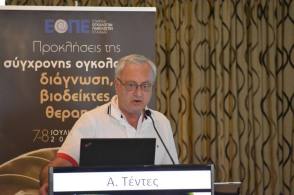
30 years of experience on General Surgery with expertise on
Cytoreductive Surgery and Intraperitoneal Chemotherapy
Antonios-Apostolos Tentes
Book an appointment
Fields of expertise
Cytoreductive Surgery
The purpose of cytoreductive surgery is the maximum possible reduction or the eradication of the peritoneally spread cancer. As has been shown by Paul Sugarbaker this is possible by the performance of standard peritonectomy procedures.
Intraperitoneal Chemotherapy
The rationale for its use is based upon the fact that there is a physiologic anatomic barrier between plasma and peritoneal cavity that does not permit rapid absorption of large molecular weight substances that are instilled in the peritoneal cavity.
Introductory Note
Peritoneal malignancy is a disease that is most commonly known as disseminated abdominal carcinomatosis or peritoneal carcinomatosis. It is usually the result of an ovarian tumor or a colorectal carcinoma or a gastric cancer or an appendiceal carcinoma or a pancreatic carcinoma. Less frequently peritoneal carcinomatosis is the result of a tumor of the internal female genitalia other than the ovarian, or of a liver or biliary carcinoma or from the peritoneum. Peritoneal sarcomatosis originates from sarcomas. In the majority of cases patients with peritoneal malignancy may undergo radical treatment.
Surgical resection is the most powerful tool for the treatment of the diseases that present with peritoneal malignancy. These diseases are ovarian cancer, colorectal or gastric cancer with peritoneal carcinomatosis, pseudomyxoma peritonei, peritoneal mesothelioma, and others either at initial diagnosis or at recurrence.
All these clinical entities except ovarian cancer were considered unresectable 30 years ago, and the patients received only systemic chemotherapy for palliation. Currently, 1/3 of these patients may undergo potentially curative treatment.
The treatment strategy includes tumor resection in combination with intraperitoneal chemotherapy (HIPEC) which is possible using a specially designed device. The purpose of this treatment is the eradication of the microscopic residual tumor that is not visible by the human eye.
This complete treatment is possible only in authorized medical centers by experts.
News
The doctor's most recent news
Cytoreductive Surgery and HIPEC in Cholangiocarcinoma
The peritoneal dissemination team participated in a large study about cytoreductive surgery and HIPEC in cholangiocarcinoma with peritoneal cancer, the results of which will be…
Read moreThe effect of intraperitoneal chemotherapy on ovarian cancer
The doctor participated in the conference titled "Challenges of contemporary oncology: diagnosis, biomarkers, treatment", which took place in Kalamata, Greece on 07-08/07/2017. He contributed to…
Read moreSurgeons Apostolos Tentes and Christos Christakis spoke to ThessNews
Surgeons Antonios-Apostolos Tentes and Christos Christakis spoke to ThessNews, Thessaloniki's weekly newspaper. The topic of the interview was peritoneal malignancy - a condition that until…
Read more



